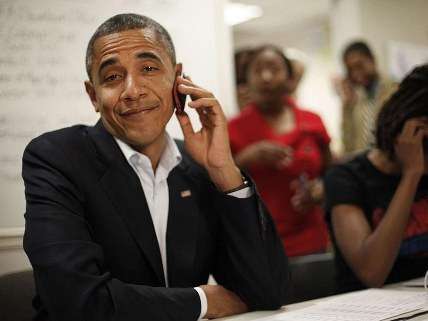Administration Finally Agrees To Keep Promise To Tell Defendants When They've Been Spied Upon

As recently as May, the Obama administration boldly broke assurances it made to the Supreme Court that criminal defendants would be informed when they were the subjects of surveillance so they could challenge such snooping. Now, under scrutiny from the American Civil Liberties Union, the New York Times and, very likely, some pissed off justices who may not like being made fools of, the Justice Department is backing off its "fuck you for believing me" stance and conceding that defendants should be informed when evidence against them was gathered via the sort of NSA-sponsored broad data collection that has featured in headlines in recent weeks.
In July, the ACLU's Patrick Toomey wrote:
The government specifically told the court that criminal defendants who were prosecuted based on evidence obtained under the FISA Amendments Act (FAA) would receive notice of that fact, which would allow them to challenge the statute.
The Supreme Court took the government at its word. In its opinion rejecting the ACLU's lawsuit, the Court repeated and relied on the government's representation that the law would be subject to challenge by criminal defendants.
Events since that time have told a very different story. As Liptak [of the New York Times] sets out in his chronology of these events, federal prosecutors have repeatedly failed to give notice of FAA evidence to criminal defendants.
Since then, of course, the New York Times publicized the administration's brazen and almost immediate failure to live up to the assurances it made to the Supreme Court on October 29 of last year. And, Edward Snowden's very public revelations made indiscriminate NSA surveillance of phone and Internet activity a topic for household discusssion. This has apparently proven…awkward for the administration. Just yesterday, government lawyers reversed themselves.
At the Wall Street Journal, Devlin Barret writes:
on May 21—months after the Supreme Court arguments—federal prosecutors in Florida said there was no obligation to disclose to criminal defendants whether evidence used against them was derived from broad data collection authorized by Congress in 2008 and approved by the Foreign Intelligence Surveillance Court. In that filing, government lawyers said such a notification would be "unwarranted and unprecedented.''
The change came in the prosecution of two brothers accused of a terrorism plot, Raees Alam Qazi and Sheheryar Alam Qazi. The judge in that case ordered the government to provide information about the secret court warrant to the defense.
On Tuesday, the government altered course, saying that generally it should provide such a notice to defendants. But it said that in the case of the Qazi brothers, prosecutors don't plan to introduce any evidence based on the surveillance program. A lawyer for one of the brothers declined to comment, while the other defendant's lawyer couldn't be reached for comment.
To the extent the government adopts such a position in future terrorism cases—that it didn't use any evidence from mass NSA surveillance—it could undercut arguments on Capitol Hill about the value of the surveillance. Supporters on Capitol Hill have often argued that the surveillance programs are vital to detecting terror plots.
This is a big deal for two reasons. It puts the government in the position of treating the information it gets via data-gathering like pretty much any other evidence — subject to disclosure to and challenge by defendants. Or, it puts the government in the position of admitting that it's spending a mint on hoovering up massive quantities of data — nearly everything a user does on the Internet, according to the latest news, subject to few checks — for no damned good purpose.
Editor's Note: As of February 29, 2024, commenting privileges on reason.com posts are limited to Reason Plus subscribers. Past commenters are grandfathered in for a temporary period. Subscribe here to preserve your ability to comment. Your Reason Plus subscription also gives you an ad-free version of reason.com, along with full access to the digital edition and archives of Reason magazine. We request that comments be civil and on-topic. We do not moderate or assume any responsibility for comments, which are owned by the readers who post them. Comments do not represent the views of reason.com or Reason Foundation. We reserve the right to delete any comment and ban commenters for any reason at any time. Comments may only be edited within 5 minutes of posting. Report abuses.
Please to post comments


Just wait until the enforcement arm of the Judicial Branch gets hold of Obama.
We're not quite that far gone yet. If the courts wanted to make this a war, they could hamstring the administration. Not as much as Congress could, where most of the real power still exists (though rarely exercised).
Not that this administration hasn't tried to ignore the courts before, but it's not a winning strategy, long term.
You mean before or after the faux trial and the guilty verdict?
Also, Pat Toomey?
They won't use the information to make a single case. The program is worthless. That is why making the I won't trade liberty for security argument here is stupid and counter productive. There is no increase in security here. I wish civil libertarians would stop ceding the argument on that issue.
Those Top Men would be trumpeting successes from the rooftops if there had been any. I don't remember a single claimed triumph, not even a single droning, attributed to the NSA trawling.
Well there's your problem.
Perhaps the Supreme Court should disbar a few US attorneys to make a point.
Start with Obama for not being a constitutional lawyer after all.
Awesome alt-text